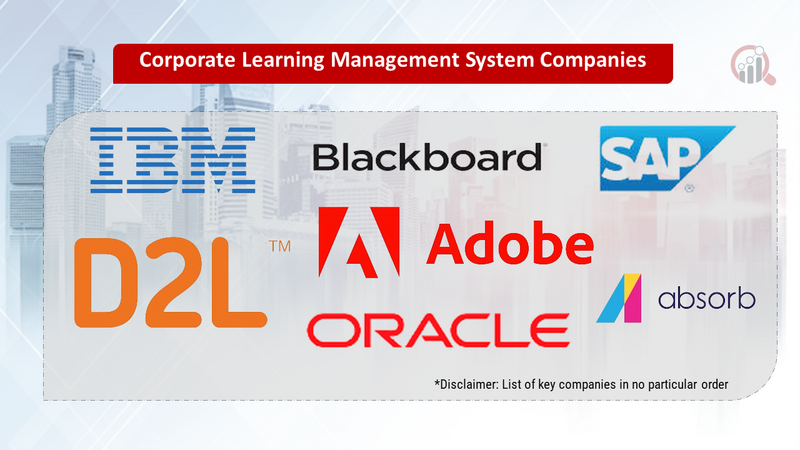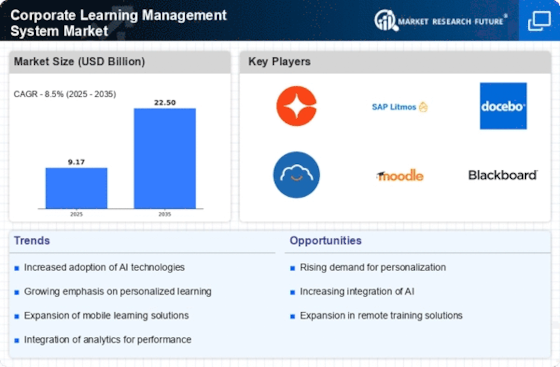Top Industry Leaders in the Corporate Learning Management System Market

Corporate Learning Management System Market: Dive into the Latest News and Updates
In today's dynamic business landscape, continuous learning and development are key for organizational success. This has fueled the exponential growth of the Corporate Learning Management System (LMS) market, with diverse platforms emerging to empower organizations in training, upskilling, and engaging their employees.
Some of Corporate Learning Management System Companies Listed Below:
- Absorb Software (Canada)
- Adobe Systems (US)
- Blackboard Inc. (US)
- CrossKnowledge (US)
- D2L (Canada)
- Growth Engineering (UK)
- IBM Corporation (US)
- iSpring Suite (US)
- Oracle Corporation (US)
- SAP SE (Germany)
- among others
Strategies Fueling Growth:
-
Focus on Content Creation and Customization: Providing tools for creating engaging and accessible learning content, customizing learning paths for diverse roles and skill levels, and leveraging microlearning modules, caters to individual learning preferences and maximizes knowledge retention. -
Artificial Intelligence and Personalization: Integrating AI for adaptive learning, personalized recommendations, and automated content curation personalizes the learning experience and optimizes knowledge acquisition for each employee. -
Mobile Accessibility and Social Learning: Offering mobile-friendly LMS platforms with engaging social learning features like forums, chat, and peer-to-peer learning fosters collaboration, knowledge sharing, and improved learning outcomes. -
Data Analytics and Performance Measurement: Providing robust data analytics capabilities within the LMS allows organizations to track training effectiveness, identify learning gaps, and measure the impact of training programs on employee performance and business outcomes.
Market Share Decoding: Key Factors to Consider:
-
Functionality and Feature Set: LMS platforms offering diverse features for content creation, delivery, performance management, and data analytics cater to broader needs and attract larger customer bases. -
Scalability and Flexibility: LMS solutions offering flexible deployment options, cloud-based accessibility, and the ability to accommodate diverse training needs and user volumes adapt to organizational growth and future requirements. -
Integration with Existing HR Systems: LMS platforms that seamlessly integrate with existing HR software and data sources optimize data utilization, streamline workflows, and enhance user experience for HR teams and employees. -
Compliance and Security Certifications: Demonstrating compliance with data privacy regulations and industry standards builds trust and ensures secure data handling, particularly relevant for organizations dealing with sensitive training materials.
New and Emerging Stars: Illuminating the LMS Path:
-
Augmented Reality and Virtual Reality Training: Startups like STRIVR and Talespin utilize AR and VR technologies to create immersive and interactive training simulations, enhancing knowledge retention and improving training results for practical skills. -
Learning Experience Platforms (LXPs): Companies like Totara and EdApp focus on delivering personalized and engaging learning experiences, integrating external content sources, and providing AI-powered learning recommendations, aiming to create self-directed and continuous learning journeys for employees. -
Microlearning and Content Curation Platforms: Startups like Axonify and Edmodo enable the creation and delivery of bite-sized learning modules, curated content playlists, and gamified learning experiences, targeting short attention spans and promoting.
Latest Company Updates:
October 2023:
-
Focus on microlearning and personalized learning: Bite-sized, tailored content caters to individual learning styles and preferences.
November 2023:
-
Gartner names top LMS vendors: Totara, SAP Litmos, Docebo, Cornerstone OnDemand, and Valamis lead the pack. -
Focus on AI and machine learning in LMS: AI-powered recommendations, adaptive learning paths, and automated content curation personalize learning experiences.
December 2023:
-
Rise of cloud-based LMS solutions: Cloud deployment offers scalability, flexibility, and cost-effectiveness. -
Focus on mobile learning and integration with productivity tools: Learning on the go and in context of daily work boosts engagement and accessibility.
January 2024:
-
LMS vendors integrate with virtual reality (VR) and augmented reality (AR): Immersive learning experiences enhance skill development and engagement. -
Focus on social learning and gamification: Collaboration features and game-based elements promote peer learning and motivation.











